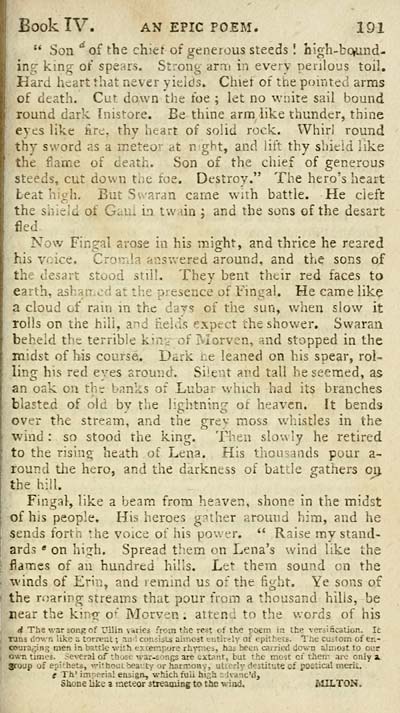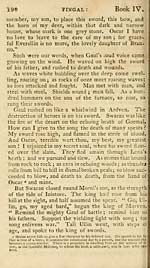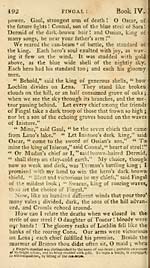Download files
Complete book:
Individual page:
Thumbnail gallery: Grid view | List view

Look TV. AN EPIC POEM. 191
" Son ** of the chief of generous steeds ! high-bound-
ing- king of* spesrs. Strong ami in every penlous toil.
KarJ heart that never yields. Chief of the poivited arms
of death. Cut down the foe ; let no vvnite sail bound
round dark Tnistore. Be thine arni like thunder, thine
eyes like hre, thy heart of solid rock. Whirl round
thy sword as a meteor at n ght, and lift thy shield like
the flame of death. Son of the chief of generous
steeds, cut down tiie foe. Destroy." The hero's heart
teat high. But S varan came with battle. He cleft
the shield of Gaui in twain ; and the sons of the desart
fled
Now Fingal arose in his ir.ight, and thrice he reared
his voice. Crotrila ansv.-ered around, and the sons of
the desart stood still. They bent their red faces to
earth, ashamed at the presence of Fmgal. He came like
a cloud of rain in the days of the sun, v/hen slow it
rolls on the hill, and tieids expect the shower. Swaraa
beheld the terrible kin= of Morven, and stopped in the
midst of his course. Dark ht leaned on his spear, rol-
ling his red eyes around. Silent and tall he seemed, as
an oak on tht banks of Lubar which had its branches
blasted of old by the lightning of heaven. It bends
over the stream, and the grey moss whistles in the
wind : so stood the king. T^^en slowly he retired
to the rising heath of Lena. His thousands pour a-
round the hero, and the darkness of battle gathers on
the hill.
Fingal, like a beam from he^.ven, shone in the midst
of his people. His heroes gather around him, and he
sends fortr. the voice of his power. " Raise my stand-
ards * on hijh. Spread tliem on Lena's wind like the
flames of an hundred hills. Let them sound on the
'■ winds of Erin, and remind us of the fight. Ye sons of
p the r(!aring streams that pour from a thousand hills, be
near the king o*^ Morven . attend to the words of his
d The war song of UUin varies from the rest of the poem in the versification. It
i nns riov.n like z. torrent ; au'! consists almost entirely of epithets. The custom of en-
I coura^ng men in battle with escempore rhymes, has been carried tlowp almost to our
j own times. Several of those war-songs are' extant, but the most of thetr are only a.
' group of epithets, without beauty or harmony, utterly destitute of poetical merit.
e Th' imperial ensign, which full high zivanc'd.
Shone lite a meteor streaming to the wind. MILTON.
" Son ** of the chief of generous steeds ! high-bound-
ing- king of* spesrs. Strong ami in every penlous toil.
KarJ heart that never yields. Chief of the poivited arms
of death. Cut down the foe ; let no vvnite sail bound
round dark Tnistore. Be thine arni like thunder, thine
eyes like hre, thy heart of solid rock. Whirl round
thy sword as a meteor at n ght, and lift thy shield like
the flame of death. Son of the chief of generous
steeds, cut down tiie foe. Destroy." The hero's heart
teat high. But S varan came with battle. He cleft
the shield of Gaui in twain ; and the sons of the desart
fled
Now Fingal arose in his ir.ight, and thrice he reared
his voice. Crotrila ansv.-ered around, and the sons of
the desart stood still. They bent their red faces to
earth, ashamed at the presence of Fmgal. He came like
a cloud of rain in the days of the sun, v/hen slow it
rolls on the hill, and tieids expect the shower. Swaraa
beheld the terrible kin= of Morven, and stopped in the
midst of his course. Dark ht leaned on his spear, rol-
ling his red eyes around. Silent and tall he seemed, as
an oak on tht banks of Lubar which had its branches
blasted of old by the lightning of heaven. It bends
over the stream, and the grey moss whistles in the
wind : so stood the king. T^^en slowly he retired
to the rising heath of Lena. His thousands pour a-
round the hero, and the darkness of battle gathers on
the hill.
Fingal, like a beam from he^.ven, shone in the midst
of his people. His heroes gather around him, and he
sends fortr. the voice of his power. " Raise my stand-
ards * on hijh. Spread tliem on Lena's wind like the
flames of an hundred hills. Let them sound on the
'■ winds of Erin, and remind us of the fight. Ye sons of
p the r(!aring streams that pour from a thousand hills, be
near the king o*^ Morven . attend to the words of his
d The war song of UUin varies from the rest of the poem in the versification. It
i nns riov.n like z. torrent ; au'! consists almost entirely of epithets. The custom of en-
I coura^ng men in battle with escempore rhymes, has been carried tlowp almost to our
j own times. Several of those war-songs are' extant, but the most of thetr are only a.
' group of epithets, without beauty or harmony, utterly destitute of poetical merit.
e Th' imperial ensign, which full high zivanc'd.
Shone lite a meteor streaming to the wind. MILTON.
Set display mode to: Large image | Transcription
Images and transcriptions on this page, including medium image downloads, may be used under the Creative Commons Attribution 4.0 International Licence unless otherwise stated. ![]()
| Early Gaelic Book Collections > Ossian Collection > Poems of Ossian, the son of Fingal > (209) |
|---|
| Permanent URL | https://digital.nls.uk/77921630 |
|---|
| Description | Selected books from the Ossian Collection of 327 volumes, originally assembled by J. Norman Methven of Perth. Different editions and translations of James MacPherson's epic poem 'Ossian', some with a map of the 'Kingdom of Connor'. Also secondary material relating to Ossianic poetry and the Ossian controversy. |
|---|
| Description | Selected items from five 'Special and Named Printed Collections'. Includes books in Gaelic and other Celtic languages, works about the Gaels, their languages, literature, culture and history. |
|---|

